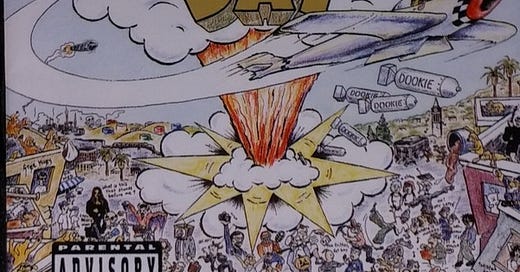Explicit Content: Grace Should Come with a Parent Warning
Because Nothing Offends Like Unconditional Love
Every week I post an essay exclusively for paid subscribers. If you’re not a paid subscriber, please consider becoming one. To entice you, use the button below for 20% off (that’s less than my budget for hair products).
When I was a teenager, I had an obsession with music that wasn’t exactly the kind my mom wanted pouring through the walls of our house. I would record the radio, perfectly timing the DC 101 DJs introducing a song so I could listen to the latest from the Smashing Pumpkins, Green Day, and Nirvana anytime I wanted. I remember standing in the aisle at Sam Goody, flipping through jewel cases. I still remember the sound of the jewel cases hitting one another. I desperately wanted to buy that one CD—the one with the “Parental Advisory: Explicit Content” label slapped on the cover like a scarlet letter of coolness. But my mom? She wasn’t having it.
She said that kind of music would rot my brain. She said the language was not “appropriate.” She said it was disrespectful. She didn’t understand why I needed it. Why I had to have it. She didn’t get the rawness, the edge, the anger—I thought it was real. I didn’t want the sugar-coated version of life. My life as a teenager wasn’t rainbows and unicorns. My parents divorced. I had to switch schools. We moved more often than kids should have to move. I had to give up my social schedule to care for my three siblings. I wanted music, I needed music that spoke truth, even if it was laced with four-letter words and rage. But she stood her ground. “Not under my roof,” she said, like a prophet laying down the law.
Years later, I think my mom, as mothers usually do, had a point—not about the music, necessarily—but about the idea of warnings. It turns out that some things in life should come with a label. Not just for shock value, but as a heads-up: This might just mess you up.
And you know what? Grace should come with one of those warnings.
Every bible should come with a warning label. And if not on the front cover, maybe right before passages like Romans 5:8—“While we were yet sinners, Christ died for us.” It would say: “Warning: This Gospel contains unconditional love, radical forgiveness, and offensive mercy. Reader discretion is advised.”
Because let’s be honest: grace is dangerous. It’s offensive.
It’s dangerous because it offends our carefully constructed sense of fairness. It’s dangerous because it levels the playing field we worked so hard to climb. It’s dangerous because it dares to tell us that God is handing out mercy like Halloween candy—no background check, resume, or moral credit score required.
And that doesn’t sit well with us, especially for those of us who find it easier to keep score on everyone else than to take an honest look at our own lives.
Grace is not some sweet lullaby you hum yourself to sleep with. Grace is a back-alley brawl with everything you thought you knew about right and wrong. Grace doesn’t play by our rules. It doesn’t reward the good little boys and girls who stayed in line and kept their noses clean. Grace throws a party for the prodigal and hands the mic to the thief on the cross. Grace doesn’t say, “Try harder.” It says, “It is finished.”
If that doesn’t mess you up, you’re not paying attention.
We’ve been formed by a world that runs on merit and achievement, punishment and reward. Work hard, play by the rules, and maybe you’ll get what you deserve. And then along comes Jesus, tossing out parables about latecomers getting full wages and fathers throwing banquets for screw-ups.
That’s not fair.
That’s not rational.
That’s not safe.
Exactly.
Grace is a scandal. It’s the kind of thing that’ll get you side-eyed by decent church people and respectable citizens. It’s the kind of thing that’ll make you lose control of your carefully managed life. It might even get you killed. (Ask Jesus.)
See, grace is not some flimsy “get out of jail free” card. It’s a disruptive, all-consuming, cross-bearing, kingdom-flipping force. It exposes your sin not to shame you, but to save you. It wounds your pride to resurrect your soul.
That’s why grace needs a warning. Not because it’s bad, but because it’s so good it’ll ruin you for anything less.
It will ruin your addiction to judgment.
It will wreck your petty scorekeeping.
It will dismantle your categories of “worthy” and “unworthy.”
It will undo everything the world told you about what it means to be successful, respectable, or righteous.
And you won’t be able to go back.
You’ll start loving people you used to hate.
You’ll start forgiving things that felt unforgivable.
You’ll start seeing God in places that once looked God-forsaken.
So maybe my mom was onto something. Maybe the things that threaten to shake us up the most really do need a warning label. Maybe, just maybe, the most dangerous thing a person can encounter is not a rap album or an R-rated movie, but the relentless, offensive, undeserved grace of God.
Grace will ruin your reputation.
Grace will upend your theology.
Grace will save your life.
Viewer discretion is advised.






It’s so amazing how you describe grace. Thank you for this powerful message.
Thanks Teer for sharing the living spirit of the gospels.